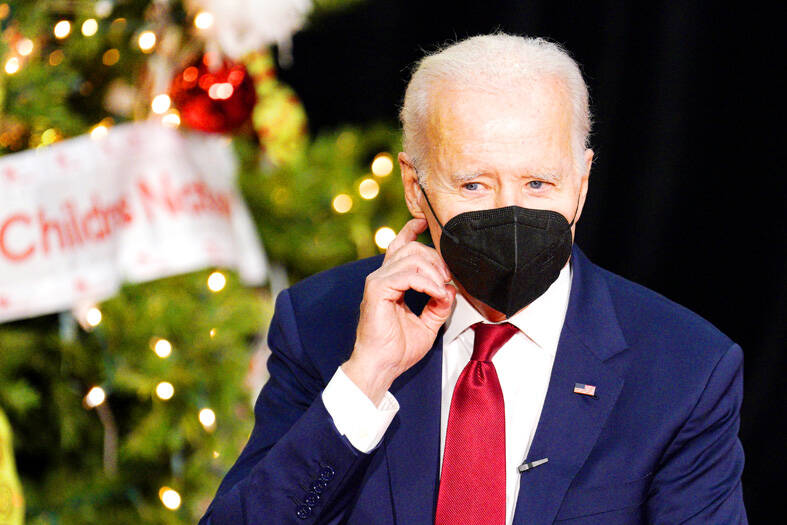Taipei yesterday lauded the US for a newly eneacted defense spending bill, while China panned the legislation, which would boost military assistance for Taiwan.
US President Joe Biden on Friday signed the US$858 billion defense bill into law, authorizing up to US$10 billion in security assistance and fast-tracked weapons procurement for Taiwan.
It also includes about US$45 billion more than Biden had requested, as lawmakers looked to offset inflation and boost the nation’s military competitiveness with China and Russia.

Photo: EPA-EFE
In the Indo-Pacific region, the legislation authorizes increased security cooperation with Taiwan and requires expanded cooperation with India on emerging defense technologies, readiness and logistics.
In Taipei, the Ministry of Foreign Affairs in a statement thanked the US Congress “for showing the great importance it attaches to Taiwan-US relations and strengthening Taiwan’s security.”
The Ministry of National Defense also thanked Washington for the legislation, saying it showed the importance the US attaches to its ties with Taiwan and bolstering the nation’s security.
Taipei is to discuss the details of the act with Washington and “gradually push forward the budget formulation and actual disbursement of the various Taiwan-friendly provisions,” the defense ministry said.
Meanwhile, the Chinese Ministry of Foreign Affairs said in a statement that the US defense bill “severely affects peace and stability across the Taiwan Strait.”
“The case ignores the facts to exaggerate a ‘China threat,’ wantonly interferes in China’s internal affairs and attacks and smears the Chinese Communist Party, which are serious political provocations to China,” the statement said.
The US is Taiwan’s most important international backer and arms supplier, despite the absence of formal diplomatic ties.
Taiwan’s military is dwarfed by that of China. Its air force in particular has come under strain from having to scramble repeatedly to see off Chinese incursions near the nation over the past couple of years.
Separately, the defense ministry yesterday reported that 11 Chinese military aircraft and three naval ships had been detected near Taiwan between 6am Friday and 6am yesterday.
Taiwanese fighter jets were deployed to warn the Chinese aircraft, and air defense missiles were deployed to monitor the activities, it added.
China in August staged major military exercises around Taiwan proper, after US House of Representatives Speaker Nancy Pelosi visited Taipei.

MAKING WAVES: China’s maritime militia could become a nontraditional threat in war, clogging up shipping lanes to prevent US or Japanese intervention, a report said About 1,900 Chinese ships flying flags of convenience and fishing vessels that participated in China’s military exercises around Taiwan last month and in January last year have been listed for monitoring, Coast Guard Administration (CGA) Deputy Director-General Hsieh Ching-chin (謝慶欽) said yesterday. Following amendments to the Commercial Port Act (商港法) and the Law of Ships (船舶法) last month, the CGA can designate possible berthing areas or deny ports of call for vessels suspected of loitering around areas where undersea cables can be accessed, Oceans Affairs Council Minister Kuan Bi-ling (管碧玲) said. The list of suspected ships, originally 300, had risen to about

DAREDEVIL: Honnold said it had always been a dream of his to climb Taipei 101, while a Netflix producer said the skyscraper was ‘a real icon of this country’ US climber Alex Honnold yesterday took on Taiwan’s tallest building, becoming the first person to scale Taipei 101 without a rope, harness or safety net. Hundreds of spectators gathered at the base of the 101-story skyscraper to watch Honnold, 40, embark on his daredevil feat, which was also broadcast live on Netflix. Dressed in a red T-shirt and yellow custom-made climbing shoes, Honnold swiftly moved up the southeast face of the glass and steel building. At one point, he stepped onto a platform midway up to wave down at fans and onlookers who were taking photos. People watching from inside

Japan’s strategic alliance with the US would collapse if Tokyo were to turn away from a conflict in Taiwan, Japanese Prime Minister Sanae Takaichi said yesterday, but distanced herself from previous comments that suggested a possible military response in such an event. Takaichi expressed her latest views on a nationally broadcast TV program late on Monday, where an opposition party leader criticized her for igniting tensions with China with the earlier remarks. Ties between Japan and China have sunk to the worst level in years after Takaichi said in November that a hypothetical Chinese attack on Taiwan could bring about a Japanese

The WHO ignored early COVID-19 warnings from Taiwan, US Deputy Secretary of Health and Human Services Jim O’Neill said on Friday, as part of justification for Washington withdrawing from the global health body. US Secretary of State Marco Rubio on Thursday said that the US was pulling out of the UN agency, as it failed to fulfill its responsibilities during the COVID-19 pandemic. The WHO “ignored early COVID warnings from Taiwan in 2019 by pretending Taiwan did not exist, O’Neill wrote on X on Friday, Taiwan time. “It ignored rigorous science and promoted lockdowns.” The US will “continue international coordination on infectious